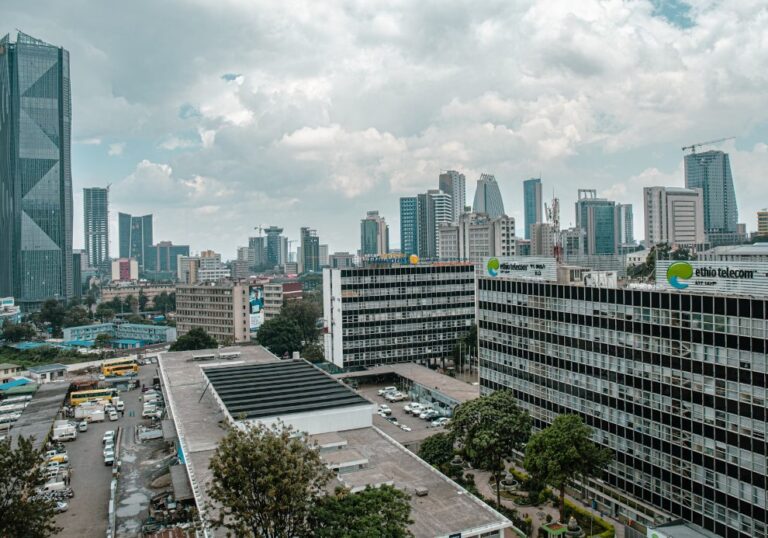In 2024, Africa is not just rising; it’s soaring. The continent, often overshadowed by narratives of challenges, is writing a new story – one of robust economic growth, innovation, and dynamic development. This article uncovers the remarkable economic journeys of six African nations, each carving out their unique paths in the global economic landscape.
From Nigeria’s oil-rich deltas to Kenya’s tech-savvy streets, from Ethiopia’s rapidly expanding industries to Rwanda’s resilient rise, these countries are not just participants but key players in the global economic arena. Join us as we explore the economic landscapes of these African powerhouses.
Table of Contents
The 6 emerging economies in Africa in 2024
Nigeria
Nigeria, with its significant GDP growth of around 2.5% in 2024, continues to be a dominant force in Africa economic landscape. The nation’s wealth has traditionally been tied to its abundant oil and gas reserves, making it one of the largest oil producers on the continent. However, the sudden inflation in fuel and decrease in the naira value is still a major concern.
Recent years have seen a strategic shift towards diversification. Sectors like agriculture, telecommunications, and services are gaining prominence, driven by government policies aimed at reducing dependence on oil and improving overall economic resilience.
Infrastructure development and efforts to combat corruption and improve governance have also played a crucial role in Nigeria’s economic narrative. The government’s focus on these areas aims to create a more conducive environment for business and investment.
Ethiopia
Ethiopia stands out for its remarkable GDP growth rate, estimated at 6-7% in 2024. This growth is fueled by a mix of agriculture, which remains the backbone of the economy, and burgeoning sectors like manufacturing and technology. The government’s focus on industrial parks and attracting foreign investment has been crucial in driving this diversification and growth.
Additionally, Ethiopia’s foray into the tech industry, particularly in light of its growing young population, is creating new economic frontiers.
Political stability under the current regime has been a significant factor in maintaining the momentum of Ethiopia’s economic ascent. The government’s commitment to infrastructure development, including roads, railways, and energy projects, has not only boosted the domestic economy but also enhanced Ethiopia’s role as a key player in regional trade and logistics. These factors combined make Ethiopia one of the most dynamic economies in Africa.
Kenya
Kenya’s economy, growing at a steady 5% in 2024, is a testament to its resilient and diverse economic structure. Agriculture remains a significant sector, with notable exports including tea and coffee. However, Kenya’s real standout feature is its advanced technology sector.
The country is hailed as a leader in mobile banking, with platforms like M-Pesa revolutionizing financial accessibility. Its capital, Nairobi, has earned the nickname “Silicon Savannah,” reflecting its status as a hub for tech startups and innovation.
The Kenyan government’s emphasis on digital infrastructure and education has fostered an environment conducive to technological advancement and innovation. This focus has not only spurred economic growth but also attracted significant international investment. Challenges such as political uncertainty and infrastructure gaps are being addressed, enhancing Kenya’s potential as a leading economy in the region.
Rwanda
Rwanda’s remarkable turnaround from its turbulent past to a fast-growing economy is a story of resilience and strategic planning.
In 2024, it boasts a GDP growth rate of around 8%, driven by sectors like tourism, agriculture, and services. The government’s efforts in promoting Rwanda as a tourism destination, coupled with its fertile lands for agriculture, have been pivotal in this growth. Additionally, Rwanda’s focus on becoming a service-oriented economy is opening new avenues for development.
The foundation of Rwanda’s economic success lies in its political stability, strong governance, and a zero-tolerance approach to corruption. The government’s investment in human capital and infrastructure, along with creating a business-friendly environment, has attracted both domestic and foreign investment.
Ghana
Ghana’s economy, with a stable growth rate of 4% in 2024, demonstrates a balanced and sustainable development model. The country’s riches in resources like gold, cocoa, and oil have traditionally driven its economy.
However, there is a growing shift towards the service sector and technology, indicating a broader economic diversification. Ghana’s democratic governance model and effective resource management have been key in maintaining steady economic growth.
Digitalization is another area where Ghana is making significant strides. The country’s efforts in leveraging technology for development, particularly in government services and finance, are noteworthy. Challenges like infrastructure deficits and rural-urban economic disparities are being actively addressed, indicating Ghana’s commitment to inclusive growth.
Ivory Coast
Ivory Coast, with a growth rate of about 6%, stands out as a robust economy in West Africa. Its economic strength primarily stems from agriculture, with the country being the world’s largest cocoa producer. However, recent years have seen a diversification into sectors like manufacturing and infrastructure development.
Economic reforms and political stability have also been central to Ivory Coast’s success. The government’s efforts in improving infrastructure, such as transportation and energy, have not only boosted domestic growth but also enhanced its regional trade capabilities. The country’s economic progress, despite challenges like political tensions and social disparities, is a positive indicator of its potential and resilience.
The African continent is rising
In 2024, the economic trajectories of these African nations epitomize a continent undergoing a profound transformation. Their stories of resilience, innovation, and strategic growth underscore Africa rising presence on the global stage.
Each nation, with its distinct approach, contributes to a vibrant and diverse economic landscape. This era is more than just growth; it’s a testament to Africa’s emerging role as a dynamic player in the global economy, heralding a period of unprecedented potential and opportunity.












